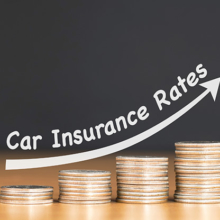How your Credit Score Affects your Insurance Rates
If you’ve ever purchased a car, applied for a mortgage, or taken out a loan, you know how important your credit score is to how much you’ll pay in interest. Little-known fact: Your credit score affects how much you’ll pay for insurance, too.
What exactly is a credit score?
You probably know that you HAVE a credit score, but what IS a credit score, exactly? Your credit score is a number that shows your likelihood of paying back a loan. It’s a numerical measure of financial trustworthiness. Credit scores range from 300 to 850.
You get your credit score via financial transactions such as paying your bills and repaying loans. Things that factor into your credit score include:
- Whether or not you pay your bills on time
- How much debt you have
- The number of loans in your name
- How much of your total credit is unused
- New applications for credit
- If you’ve ever had a foreclosure or bankruptcy
- If you’ve ever had a debt sent to collections
Insurance companies may use your credit score to determine your rates
Just as a mortgage company uses your credit score to determine how much interest to charge you on a loan, an insurance company uses your credit score to determine how risky you are to insure and how much your premiums should be.
In general, people with lower credit scores are more likely to get into accidents and file claims with their insurance companies. Insurance companies may charge higher rates to people with lower credit scores because there is a higher likelihood that those drivers will cost the insurance company money.
The methodology may seem unfair. After all, just because you pay your bills on time doesn’t mean you’re a great driver, right? But data supports the accuracy of credit-based insurance rates.
The theory is that, if a person is conscientious about paying their bills on time, they’re also likely to be conscientious about maintaining their homes and vehicles so that accidents don’t happen and claims aren’t filed. People with better credit scores tend to be more risk-averse, and that’s a good thing in the eyes of an insurance company.
Credit isn’t the only factor that determines your rates
For insurance companies that use a credit-based scoring system, credit is only one factor that they consider when determining rates. Insurance companies will also look at your claims history, driving record (for car insurance), and other factors when determining how much you’ll pay for premiums. If your credit score is low, but you have a perfect driving record or have never filed a homeowners insurance claim, you may end up paying the same as a person with great credit but several accidents on their record.
Want to find the best rates for insurance no matter your credit score?
Edwards Insurance Agency in Taylors, S.C. helps people all over South Carolina, North Carolina, Georgia and Tennessee find affordable home, car, motorcycle and boat insurance no matter their credit score. Give us a call today!





